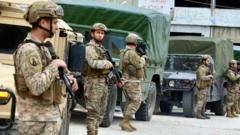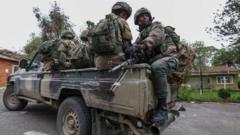**The ongoing conflict escalates with a new deadline for the ceasefire agreement as casualties mount.**
**Lebanon and Israel Extend Ceasefire Amid Ongoing Tensions**

**Lebanon and Israel Extend Ceasefire Amid Ongoing Tensions**
**Ceasefire deal between Lebanon and Israel extended to mid-February following renewed violence.**
Lebanon's Prime Minister Najib Mikati announced today that the ceasefire agreement with Israel, initially set to expire this past Sunday, has been extended to February 18. This extension follows increased tensions and violence, with Israel retaining military forces in southern Lebanon, citing concerns about Hezbollah's presence in the area. According to Lebanon's health ministry, conflicts have recently resulted in the deaths of 22 individuals and left 124 injured, predominantly among civilians attempting to return home.
The ceasefire, brokered by the United States and France, aimed to bring an end to a protracted 14-month conflict involving Israel and Hezbollah, the powerful militant group supporting Palestinian causes. The original terms mandated Hezbollah to withdraw its armed presence from southern Lebanon within 60 days, while Israeli forces were to pull back during the same time frame. Shortly before the original deadline, Israeli authorities expressed their dissatisfaction with what they labeled as Lebanon's lack of compliance.
The White House's announcement emphasized that renewed negotiations would commence regarding the fate of Lebanese prisoners captured by Israel after the outbreak of hostilities on October 7, amidst violent clashes that have affected thousands of civilians. Despite warnings about potential dangers in border regions, there has been marked movement among Lebanese residents returning to their homes, fueled by hopes of stability following the ceasefire.
The conflict, which intensified last September, has led to extensive Israeli military operations across Lebanon, culminating in a tragic toll on civilians and displacing over a million. In light of Hezbollah's alignment with Hamas's recent actions in Gaza, tensions remain fraught. As the ceasefire agreement continues to hang by a thread, both Lebanon and Israel face significant challenges in securing lasting peace in the region.
The ceasefire, brokered by the United States and France, aimed to bring an end to a protracted 14-month conflict involving Israel and Hezbollah, the powerful militant group supporting Palestinian causes. The original terms mandated Hezbollah to withdraw its armed presence from southern Lebanon within 60 days, while Israeli forces were to pull back during the same time frame. Shortly before the original deadline, Israeli authorities expressed their dissatisfaction with what they labeled as Lebanon's lack of compliance.
The White House's announcement emphasized that renewed negotiations would commence regarding the fate of Lebanese prisoners captured by Israel after the outbreak of hostilities on October 7, amidst violent clashes that have affected thousands of civilians. Despite warnings about potential dangers in border regions, there has been marked movement among Lebanese residents returning to their homes, fueled by hopes of stability following the ceasefire.
The conflict, which intensified last September, has led to extensive Israeli military operations across Lebanon, culminating in a tragic toll on civilians and displacing over a million. In light of Hezbollah's alignment with Hamas's recent actions in Gaza, tensions remain fraught. As the ceasefire agreement continues to hang by a thread, both Lebanon and Israel face significant challenges in securing lasting peace in the region.





















